广州小学英语四年级下册复习要点[1]
小学四年级下英语复习资料M1-M10
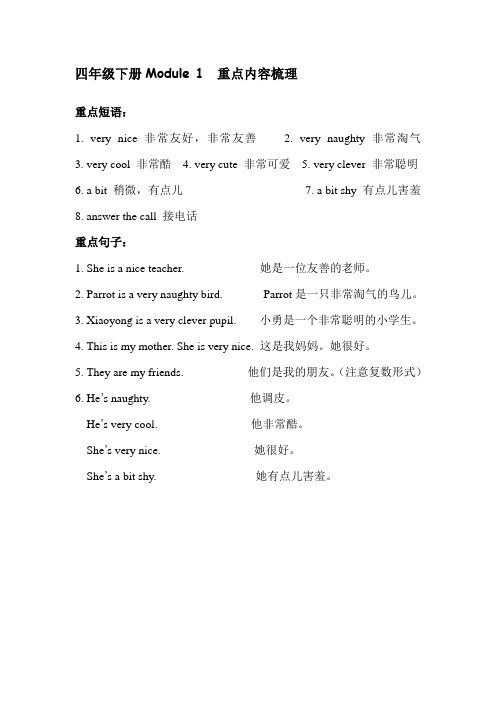
重点短语:1. very nice 非常友好,非常友善2. very naughty 非常淘气3. very cool 非常酷4. very cute 非常可爱5. very clever 非常聪明6. a bit 稍微,有点儿7. a bit shy 有点儿害羞8. answer the call 接电话重点句子:1. She is a nice teacher. 她是一位友善的老师。
2. Parrot is a very naughty bird. Parrot是一只非常淘气的鸟儿。
3. Xiaoyong is a very clever pupil. 小勇是一个非常聪明的小学生。
4. This is my mother. She is very nice. 这是我妈妈。
她很好。
5. They are my friends. 他们是我的朋友。
(注意复数形式)6. He’s naughty. 他调皮。
He’s very cool. 他非常酷。
She’s very nice. 她很好。
She’s a bit shy. 她有点儿害羞。
重点单词及短语:1. Buckingham Palace 白金汉宫2. Big Ben 大本钟3. Hyde Park 海德公园4. Tower Bridge 塔桥5. a big city 一个大城市6. a small village一个小村庄7. very big and beautiful 很大很漂亮8. very famous and beautiful 很有名很漂亮9. about London 关于伦敦10. be close to 接近,靠近......11. whose house 谁的房子12. the Queen’s house 女王的房子重点句子:1. London is a big city. 伦敦是个大城市。
2. This is a book about London. 这是一本关于伦敦的书。
必须广州版小学英语四年级下册复习要点及练习

必须广州版小学英语四年级下册复习要点及练习Company number【1089WT-1898YT-1W8CB-9UUT-92108】Module 1 A g e 一、询问他人名字和年龄:1.询问对方名字:- What’s your name - My name is _____.2.询问他人名字:- What’s that boy’s name - His/Her/Its name is _____. 3.询问对方年龄:- How old are you - I am _____ years old.4.询问他人年龄:- How old is he/she/it/that girl - He/She/It is (about) _____ years old.二、现在进行时——表示说话当时正在发生的事情或动作。
时态结构:主语(人称/人物/动植物/物品)+ am/is/are + 动词-ing形式(现在分词)例如:I am coming. / He is running. / She is sleeping. / We are playing chess.重点1:am/is/are 的选用要与前面的主语人称一致。
重点2:动词-ing形式(现在分词)的变型要拼写正确。
★动词-ing变化规律三、描写一个人的外貌特征:He/She/It looks young/beautiful/strong/tall/slim.They look (so) cute.四、祝贺生日用语:Happy Birthday!回答:Thank you!送礼物用语:Here is your birthday present from me/your father.回答:Thank you!五、动词ing的基本变化规则(1)直接加ing,如do—doing, paint—painting(2)去e再加ing,如have—having, come—coming give—giving, drive—driving, make—makingclose—closing, use—using(3)双写最后一个辅音字母,再加ing,如:shop—shopping, skip—skipping, sit—sitting run—running, put—putting, get—gettingswim—swimming, forget—forgettingModule 2 Activities一.询问他人正在做什么事:回答用正在进行时问:What are you doing What is he/she doingWhat are they doing答:I am listening to the music. He/She is playing guitar.They are playing basketball.复习现在进行时的时态,结构:am/are/is+动词ing。
小学英语四年级下册知识点总结复习资料完美版
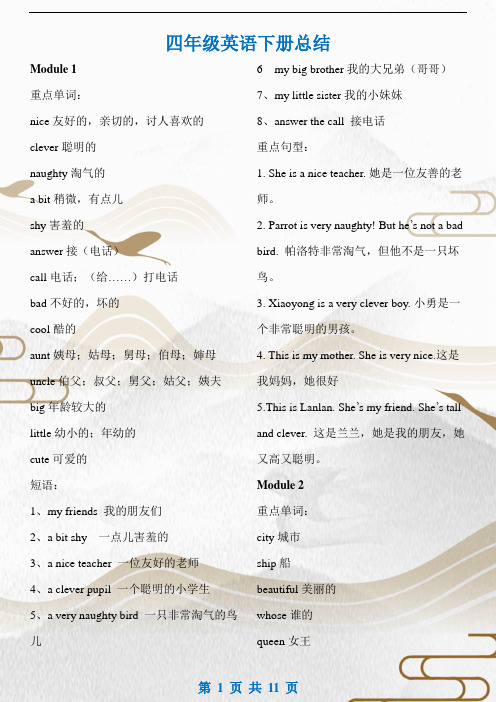
四年级英语下册总结Module 1重点单词:nice友好的,亲切的,讨人喜欢的clever聪明的naughty淘气的a bit稍微,有点儿shy害羞的answer接(电话)call电话;(给……)打电话bad不好的,坏的cool酷的aunt姨母;姑母;舅母;伯母;婶母uncle伯父;叔父;舅父;姑父;姨夫big年龄较大的little幼小的;年幼的cute可爱的短语:1、my friends 我的朋友们2、a bit shy 一点儿害羞的3、a nice teacher 一位友好的老师4、a clever pupil 一个聪明的小学生5、a very naughty bird 一只非常淘气的鸟儿6 my big brother我的大兄弟(哥哥)7、my little sister我的小妹妹8、answer the call 接电话重点句型:1. She is a nice teacher. 她是一位友善的老师。
2. Parrot is very naughty! But he’s not a bad bird. 帕洛特非常淘气,但他不是一只坏鸟。
3. Xiaoyong is a very clever boy. 小勇是一个非常聪明的男孩。
4. This is my mother. She is very nice.这是我妈妈,她很好5.This is Lanlan. She’s my friend. She’s tall and clever. 这是兰兰,她是我的朋友,她又高又聪明。
Module 2重点单词:city城市ship船beautiful美丽的whose谁的queen女王close近的,接近的old年代久的,古老的famous著名的短语1、a book about London 一本关于伦敦的书2、be from…来自…(是…人)3、the capital of England 英国的首都4、Buckingham Palace 白金汉宫5、the Queen’s house 女王的房子6、the River Thames 泰晤士河7、on the river 在河上8、Big Ben 大本钟9、Hyde Park 海德公园10、Tower Bridge 塔桥重点句型:1. This is a book about London. 这是一本关于伦敦的书。
2024年小学四年级英语下册知识点资料
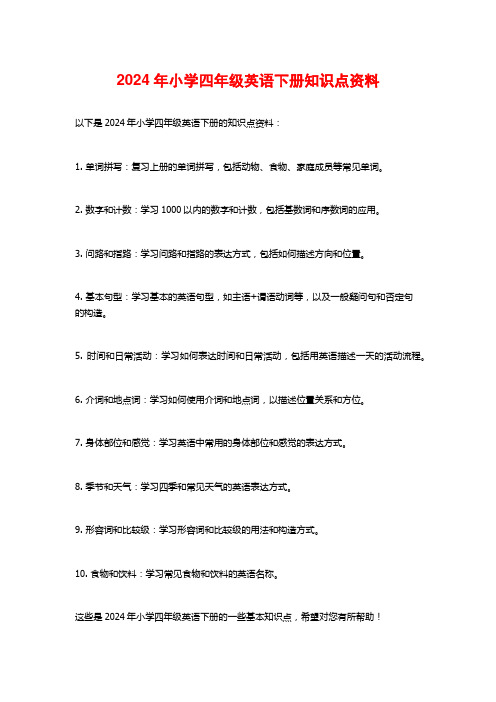
2024年小学四年级英语下册知识点资料
以下是2024年小学四年级英语下册的知识点资料:
1. 单词拼写:复习上册的单词拼写,包括动物、食物、家庭成员等常见单词。
2. 数字和计数:学习1000以内的数字和计数,包括基数词和序数词的应用。
3. 问路和指路:学习问路和指路的表达方式,包括如何描述方向和位置。
4. 基本句型:学习基本的英语句型,如主语+谓语动词等,以及一般疑问句和否定句
的构造。
5. 时间和日常活动:学习如何表达时间和日常活动,包括用英语描述一天的活动流程。
6. 介词和地点词:学习如何使用介词和地点词,以描述位置关系和方位。
7. 身体部位和感觉:学习英语中常用的身体部位和感觉的表达方式。
8. 季节和天气:学习四季和常见天气的英语表达方式。
9. 形容词和比较级:学习形容词和比较级的用法和构造方式。
10. 食物和饮料:学习常见食物和饮料的英语名称。
这些是2024年小学四年级英语下册的一些基本知识点,希望对您有所帮助!。
四年级下册广州版英语知识点

四年级下册广州版英语知识点
四年级下册广州版英语知识点包括以下内容:
1. 词汇:学生应掌握一定的单词量,并能正确理解和使用这些单词。
如身体部位、学科、职业、动物、食物、颜色、数字、家庭成员等基本的日常生活词汇。
2. 语法:学生应掌握一些基本的语法知识,如主谓一致、名词的单复数形式、时态的用法、情态动词、比较级和最高级等。
3. 句型:学生应能理解和运用一些简单的句型结构,如肯定句、否定句、疑问句、祈使句等。
4. 对话:学生应能进行一些简单的对话,如问路、订购食物、购物、询问时间等常见场景下的对话。
5. 阅读理解:学生应能理解简单的短文,并能回答相关问题。
6. 写作:学生应能写出一些简单的句子和段落,如描述自己的家庭、日常活动等。
7. 听力:学生应能听懂一些简单的英语对话和文章,并能根据听到的内容进行回答。
8. 发音:学生应能正确地发出一些较为复杂的音素,如元音、辅音和音标等。
以上是四年级下册广州版英语的一些基本知识点,希望对你有帮助。
小学四年级英语下册知识点及复习要点

人教版小学四年级英语下册知识点及复习要点第一单元our school一、对应词my ---your I ---you our---your this --- thathere----there yes----no come----go teacher----studentboy----girl his---her二、知识点1、表示在几楼上,要用介词on,如on the first floor.在一楼;The first 表示第一的,序数词在使用时前面一定要加the,表示事物的排列顺序;2、介绍离自己近的事物时用this is .,介绍离自己比较远的事物时用that is 如:This is my computer.这是我的计算机;Thatis your computer.那是你的计算机;3、how many多少用来询问物品的数量有多少,后面只能跟名词的复数形式;如Howmany books do you have你有多少本书4、当表示有一个时,名词的前面可以用a或者an.元音前用an ,辅音前用a.如an apple一个苹果 an orange一个橙子apear一个梨a dog一只狗5、当用Is this Is that提问时,一般用肯定回答是:Yes, itis.否定是: No , it isn’t.三、句子:1、This is the teacher’s office.这是老师办公室;2、That is my classroom.那是我的教室;3、Go to the library. Read a story-book..去图书馆;读故事书;4、Is this the library Yes, it is.这是图书馆吗是的;5Isthat the art room The art room is on the second floor. 那是美术室吗不是,美术室在二楼;6、Whereis the canteenIts on the first floor.食堂在哪里在一楼;7、How many students are there in youclass Forty.数字8、 8、Let’s go and have a look 让我们去看一看;四、单词:playground garden library artroom light picture boardteachers'office gym TV room teacher’s desk wallfloor your computer fan this way ,please五、Go to the library ,read a book.Go to the teachers’ office, say hello.Go to the playground, play football.Go to the garden, water the flowers.复习知识点Unit 1A部分:computer计算机 board写字板 fan风扇light灯This is my computer.这是我的电脑;That is your computer.那是你的电脑B部分:teacher′s desk讲台picture图画;照片wall墙壁floor 地板Is this a teacher’s desk ——Yes, it is.第二单元:What time is it一、知识点1、同义词:supper ===dinner晚饭2、say第三人称单数 says have =has3、同义句:Whattime is it ===What’s the time现在几点了4、Let’s 后面直接跟动词的原形;如:Let’s go让我们走吧Let’s clean the classroom.让我们打扫教室吧5、It’stime for后面跟名词;如:It’s time fordinner.该吃晚饭了; It’s time for Englishclass.该上英语课了It’s time to 后面跟动词;如:It’stime to eat dinner.该吃晚饭了; It’s time to have English class.该上英语课了;二、句子:1、What time is it 几点钟了2、It’s nine o’clock.现在九点;3、It’s time for English class.该上英语课了;lunch English class musicclass breakfast dinner class4、School is over. Let’s go to the playground.放学了,让我们去操场吧5、It’s time to go to school.该去学校了get up go to school go to bed go home三、单词:lunch English class music class breakfast dinner class get up go to school go to bed go home just a minute 复数形式:foot----feet 脚四、It’s time for breakfast. Let’s drinksome milk.It’s time for lunch. Let’s have some chicken.It’s time for dinner. Let’s eat some rice.It’s time for PE class. Let’s jump and run.It’s time for English class. Let’s read and write.It’stime for music class. Let’s sing and dance.Unit 2复习知识点A部分:one一two二three三four 四five五six六seven七eight八nine九ten十What time is it ——It’s two o’clock.B部分:math数学Chinese语文English英语.体育music音乐class 课程It’s 9:45. It’s time for math class.第三单元weather一、知识点1.同义词:Howabout ===What about怎么样2、表示天气的几个形容词都是同是由相应的名词变化而来的,它们的对应形式是:名词形式形容词形式rain雨 rainy下雨的snow雪 snowy下雪的wind风 windy有风的cloud云 cloudy有云的sun阳光 sunny晴朗的3、一般疑问句Canyou 的回答形式有两种肯定回答是:Yes, I can. 否定回答是: No, I can’t.一般疑问句Can I 的回答形式也有两种肯定回答是:Yes, you can.否定回答是: No, you can’t.4、当问某个地方的天气如何时,要用What’s the weather like in +地名如:What’s the weather like in Beijing北京的天气怎么样二、单词cold cool warm hot sunny windy cloudy snowy rainy outside be careful weather New York degree world London Moscow Singapore Sydney fly loveUnit3复习知识点A部分:red红色的blue蓝色的yellow黄色的green绿色的white白色的Is thisthatyour T-shirt ——No, it’s not.Yes,it is.B部分:jacket夹克衫shirt衬衫skirt裙子dress连衣裙T-shirt T恤衫What colour is it ——It’s white.第四单元At the farm一、复数形式Sheep = sheep 绵羊 hen= hens母鸡Goat= goats山羊cow= cows奶牛horse= horses马foot=feet脚 tooth= teeth牙齿二、可数名词变复数的规则:1、一般情况下,在单数名词词尾加“s”.如:Cat= cats dog=dogs book= books ruler= rulers2、在以s,ss , x , sh , ch结尾的名词后面加“es”,如:Box= boxes peach=peaches bus= buses class= classes3、在以o结尾的单词后面加“es”,如: Tomato= tomatoes potato=potatoes4、以元音字母加y结尾的名词,直接加“s”如: Boy=boys toy=toys day= days以辅音字母加y结尾的名词,去掉y后加“ies”,如: Baby= babies lady= ladies butterfly =butterflies5、以f,fe结尾的名词,去掉f或fe后加“ves”,如:shelf=shelves leaf=leaves knife= knives三、I like 后面要加可数名词的复数形式或者不可数名词,如:I like apples .我喜欢苹果;I like chicken.我喜欢鸡肉;四、特殊疑问句:What are these What are thoseWhat arethey 在回答时,都要用“They are ”What is thisWhat is thatWhat is it在回答时都要用It’s a an一般疑问句:AretheseAre thoseAre they 的回答形式也都是一样的,肯定回答:Yes, they are.否定回答:No, they aren’t. 一般疑问句:Is this aan Is that aanIs it aan的回答形式也都是一样的,肯定回答:Yes, it is.否定回答:No, it isn’t.五、单词tomato potato green beans carrot horse cow sheep hen these yummy animal those garden farm goatUnit4重点A部分:jeans牛仔裤pants长裤socks袜子shoes鞋子It’s warm today. Let’s play football.B部分:sunny晴朗的warm温暖的cold寒冷的snowy下雪的It’s cool. Is it cold ——Yes,it is.No, it’snot.第五单元My clothes一、知识点1、对应词:puton -- take off white=black these—those2、特殊疑问词Whatcolour什么颜色用来问物体的颜色,回答时一定要有表示颜色的词语;如:What colour is your bag It’s blue.3、Who和Whose的区别: Who谁; 用来问人是谁;如:Who is thatgirl 那个女孩是谁 She is mysister.她是我的姐姐;Who is that tall man那个高个子男人是谁He is my father.他是我的爸爸;Whose谁的; 用来询问物品是谁的;在回答Whose引领的问题时,如果答案有人名,要在人名的后面加's,其中的’s表示“某人的”;如:Whose shirt is this 这是谁的衬衣It’s Mike’s .它是mike的;Whose bike is blue 谁的书包是蓝色的 My bag is blue.我的书包是蓝色的;4、have第三人称单数 has5、pants, socks , shoes , shorts , jeans这些单词都是成双成对出现的,所以在句子中一般都是复数形式;如:These are my shoes.这是我的鞋子;Those are your socks.那是你的袜子;6、人称代词和名词性物主代词对应:我I 我的my你you 你的your他he 他的his她she 她的her我们we 我们的our你们you 你们的your他她们they 他她们的their人称代词一般在句中用作主语;物主代词一般后面加名词; 二、短语Put on your shirt.穿上你的衬衫Hang up your dress.把连衣裙挂起来Take off your hat. 摘下你的帽子Wash your skirt .洗洗你的裙子Put away your pants.收好你的裤子;三、单词Clothes pants hat dress skirt coat sweater sock shorts jacketShirt yours whose mine pack waitUnit5A部分:big大的small小的long长的short短的nice好的How much is it ——It’s ten yuan.B部分:apple苹果banana香蕉pear梨orange橙子watermelon西瓜How much are they ——They’re three yuan.第六单元shopping一,知识点1、CanI help you 是一般购物时,售货员的礼貌用语;2、How much与How many的区别:How much意思是多少钱用来问物品的价格;在回答时一般要有表示价钱的单位;如:问一件物品的价钱时用How much isHow much is this jacket 这件夹克衫多少钱It’s forty-five yuan.它是45元;问多件物品的价钱时用How much areHow much are these books 这些书多少钱 They are ninety-nine yuan.它们是99元;2、Howmany意思是多少;用来询问物品的数量有多少,后面跟名词的复数形式,回答时一般数字后面没有单位;如:How many horses are there 那儿有多少匹马They are 12. 有12匹;二、单词glove scarf umbrella sunglasses pretty expensivecheap nice Try on size ofcourse too just how mucheighty dollar saleUnit6A部分:cat猫rabbit兔子pig猪duck 鸭子dog狗horse马Are they ducks ——No, they aren’t.B部分:eleven十一twelve十二thirteen十三fifteen十五twenty二十How many horses are there ——Twelve.句型翻译1Whereisthe canteen 餐厅在哪里——It’sonthe first floor.餐厅在一楼;2Doyouhave a library 你们有图书馆吗——Yes, Ido.3Doyouhave lunchatschool你们在学校吃饭吗——Yes, I do.4This way, please.请这边走;5Welcometoour school.欢迎来我们学校6this board这个写字板7that light 那盏灯8Isthat your gym那是你们的体育馆吗——Yes, it is./ No, it isn’t.No, it’s not.9Isthis your garden 这是你们的花园吗——Yes, itis./ No, itisn’t.No, it’s not.10Just a minute.再等一会11Hurryup 抓紧赶快;12It’s timetoget up.该起床了;It’s time to +动作go to school /go home/go to bed.13It’s timeforEnglish class.该上英语课了;It’stime for +名称.14Wherearethe socks 袜子在哪里——Theyarein/on/under/near/behind…15Whereisthe skirt 裙子在哪里——Itisin/on/under/near/behind…16I have anew dressformy birthday party.我为我的生日派对准备了一条新连衣裙I like the white sweater with the greenskirt.我喜欢白色毛衣搭配绿色短裙;17)These aremy jeans.那是我的牛仔裤;18)18Those aremy pants.那是我的长裤;19)Lookatmy T-shirt.看看我的体恤衫;20)20I havetoclose the window.我必须关上窗户;21CanI wear my shirttoday ——No, youcan’t./Yes, youcan.我今天能穿我的衬衫吗22A:What’s the weather like in Beijing北京天气怎么样B:—It’srainy New York 纽约怎么样A:It’ssunny.24)How much is that colour ful dress 那五颜六色的连衣裙多少钱——They are.....yuan.25How much are these sandals 那双凉鞋多少钱——They arethirty-fiveyuan.26Iwant apairofsneakers/sandals/boots slippersformy son.我想给我儿子买一双…….27What size ——Size Five.多大号码五号28Are theyallright / nice 它们合适吗美吗——Yes, they are./No,they aren’t.29Are theyhorses ——Yes, theyare./ No, theyaren’t.它们是马吗30How many cows do you have 你有多少奶牛——I have / We have one hundred.我有/我们有100头奶牛;31Whatare these/those/they 这些/那些/它们是什么——These/Those/They are…32Are theypotatoes 它们是土豆吗——Yes, they are./ No, they aren’t.33Are thesetomatoes 这些是番茄吗——Yes, they are./ No, they aren’t.34Are thosecucumbers 那些是黄瓜吗——Yes, they are./ No,they aren’t.语音考点1. a1cake snake grapes face potato take2apple bag cat hat that lamb fan fat carrot jacket math rabbit2. e1me she we he these2egg desk pen bed dress hen help ten twenty3. i1bike library rice kite ice-cream light nine five2milk six fish pig big window is it dinner fifteen4. o1hole home nose rose over cold go hello potato2box fox orange lock dog donkey long not sock5. u1student cute tube music computer2bus umbrella toothbrush cup duck up much but。
广州版四年级英语下册全册知识点归纳
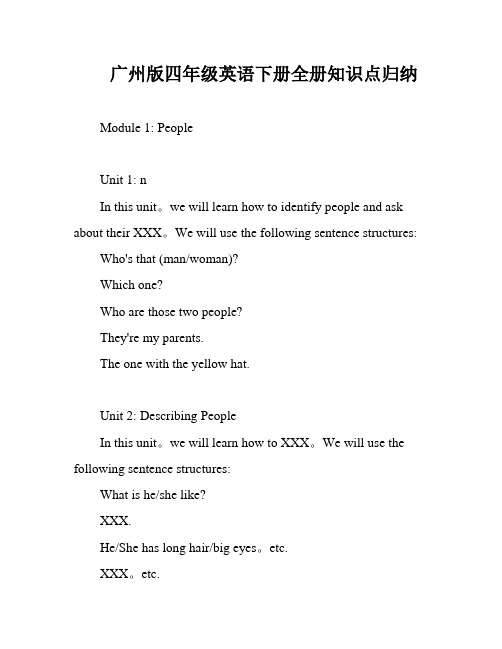
广州版四年级英语下册全册知识点归纳Module 1: PeopleUnit 1: nIn this unit。
we will learn how to identify people and ask about their XXX。
We will use the following sentence structures: Who's that (man/woman)?Which one?Who are those two people?They're my parents.The one with the yellow hat.Unit 2: Describing PeopleIn this unit。
we will learn how to XXX。
We will use the following sentence structures:What is he/she like?XXX.He/She has long hair/big eyes。
etc.XXX。
etc.Key Points:1.We will XXX words containing "c," ".ck," "as(s)," "au/aw," and "air."2.XXX "in" can be used to describe someone's clothing。
while "with" can be used to describe something they have or are carrying.3.We will learn how to use "which" to ask about specific items。
such as pXXX.4.We will review the subjects we have learned。
2023年新版小学四年级英语下册复习知识点整理

PEP小学四年级英语下册复习知识点Unit 1 单词:first floor 一楼second floor 二楼teacher’s office 教师办公室library 图书馆playground 操场computer room 计算机房art room 美术教室music room 音乐教室next to 紧邻;在…近旁homework 作业class 班;班级forty 四十way 方向Let’s do:Go to the library. Read a book. 去图书馆看书Go to the teachers’office. Say hello. 去教师办公室问好Go to the playground. Play football. 去操场踢足球Go to the garden. Water the flowers. 去花园浇花发音:字母组合er, water tiger sister dinner computer ruler句型:1、——Where’s the teachers’ office? 教师办公室在哪里?——It’s on the first floor. 它在一楼。
2、——Is this the teachers’ office? 这是教师办公室吗?——No, it isn’t. 不,不是。
The teachers’ office is next to the library. 教师办公室紧挨着图书馆。
3、Is that the computer room? 那是计算机房吗?4、Do you have a library? 你们有图书馆吗?Yes, we do. 是旳,我们有。
Unit 2 单词:breakfast 早餐;早饭English class 英语课lunch 午餐;午饭music class 音乐课PE class 体育课dinner 正餐get up 起床go to school 去上学go home 回家go to bed 上床睡觉over 结束now 目前;目前o’clock(表达整点)…点钟kid小孩thirty三十hurry快点come on快;加油just a minute 稍等一会儿Le t’s do:It’s time for breakfast. Let’s drink some milk. 届时间吃早餐了,我们喝些牛奶。
四年级下册广州版英语知识点

四年级下册广州版英语知识点
四年级下册广州版英语教材中包含了许多重要的知识点,让我们一起来了解一下吧!
1. 数字和计数:
在这一学期,四年级学生将学习更大的数字,并学习如何进行计数。
他们将学会念数字,并学习如何用英语来表达不同的数量。
同时,他们还将学习如何用英语来进行简单的加减法。
2. 常见动物和植物:
四年级学生将学习许多常见的动物和植物的英文名称。
他们将学习如何用英语来描述这些动物和植物的外貌和特征,并学习如何用英语来询问关于动物和植物的问题。
3. 问路和交通工具:
四年级学生将学习如何用英语来问路和描述不同的交通工具。
他们将学习如何用英语来指示方向,并学习如何用英语来描述不同的交通工具的用途和特点。
4. 介绍自己和他人:
在这个学期,四年级学生将学习如何用英语来介绍自己和他人。
他们将学习如何用英语来描述自己和他人的外貌和性格,并学习如何用英语来询问他人的个人信息。
5. 时间和日期:
四年级学生将学习如何用英语来表达时间和日期。
他们将学习如何用英语来问询时间和日期,并学习如何用英语来描述不同的时间和日期。
6. 季节和天气:
四年级学生将学习如何用英语来表达不同的季节和天气。
他们将学习如何用英语来描述不同季节的特点和不同天气的情况,并学习如何用英语来询问天气情况。
以上是四年级下册广州版英语教材的一些重要知识点。
通过学习这些知识点,学生将能够更好地理解和运用英语,并提升他们的英语交流能力。
希望这些知识点对学生们的学习有所帮助!。
广州版科教版小学英语四年级下册Unit 1 He looks like a cook
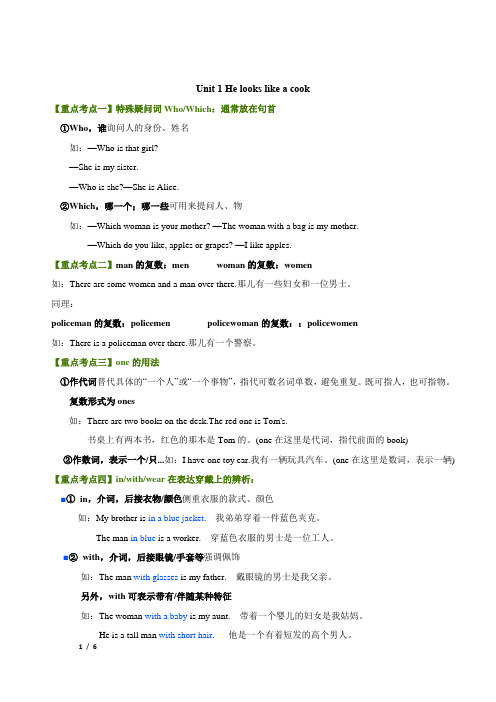
Unit 1 He looks like a cook【重点考点一】特殊疑问词Who/Which:通常放在句首①Who,谁询问人的身份、姓名如:—Who is that girl?—She is my sister.—Who is she?—She is Alice.②Which,哪一个;哪一些可用来提问人、物如:—Which woman is your mother? —The woman with a bag is my mother.—Which do you like, apples or grapes? —I like apples.【重点考点二】man的复数:men woman的复数:women如:There are some women and a man over there.那儿有一些妇女和一位男士。
同理:policeman的复数:policemen policewoman的复数::policewomen如:There is a policeman over there.那儿有一个警察。
【重点考点三】one的用法①作代词替代具体的“一个人”或“一个事物”,指代可数名词单数,避免重复。
既可指人,也可指物。
复数形式为ones如:There are two books on the desk.The red one is Tom's.书桌上有两本书,红色的那本是Tom的。
(one在这里是代词,指代前面的book)②作数词,表示一个/只...如:I have one toy car.我有一辆玩具汽车。
(one在这里是数词,表示一辆) 【重点考点四】in/with/wear在表达穿戴上的辨析:■①in,介词,后接衣物/颜色侧重衣服的款式、颜色如:My brother is in a blue jacket. 我弟弟穿着一件蓝色夹克。
The man in blue is a worker. 穿蓝色衣服的男士是一位工人。
广州版英语四年级下学期全册知识点归纳

Unit 1: Places- Vocabulary: bank, hospital, library, post office, supermarket- Sentence patterns: Where is the _____? It’s near the_____.- Grammar: Prepositions of place (on, in, near, next to)Unit 2: Activities- Vocabulary: draw, read, swim, write, play- Sentence patterns: What do you want to do? I want to _____.- Grammar: Verbs of activities in the present tenseUnit 3: Healthy Lifestyle- Vocabulary: breakfast, lunch, dinner, fruit, vegetables- Sentence patterns: What do you have for _____? I have_____ for _____.- Grammar: Count and non-count nounsUnit 4: Seasons and Weather- Vocabulary: spring, summer, autumn, winter, sunny, rainy, cloudy, windy- Sentence patterns: What’s the weather like today? It’s_____.- Grammar: Adjectives to describe seasons and weatherUnit 5: Sports- Vocabulary: basketball, football, swimming, running- Sentence patterns: Do you like _____? Yes, I do. / No, I don’t.- Grammar: Verbs to express likes and dislikesUnit 6: Daily Routines- Vocabulary: get up, have breakfast, go to school, have lunch, go home, go to bed- Grammar: Present simple tense for daily routinesUnit 7: Food and Drinks- Vocabulary: noodles, rice, bread, milk, juice- Sentence patterns: What would you like to eat/drink? I would like some _____.- Grammar: Countable and non-countable nouns for food and drinksUnit 8: Clothes- Vocabulary: hat, coat, shirt, dress, trousers- Sentence patterns: What are you wearing? I’m wearing a _____.- Grammar: Articles (a, an, the)Unit 9: My Family- Vocabulary: father, mother, brother, sister, grandparents- Sentence patterns: How many _____ do you have? I have_____.- Grammar: Plural form of nounsUnit 10: My School- Sentence patterns: What’s in the _____? There is a _____.- Grammar: There is / There areUnit 11: My Hobbies- Vocabulary: dancing, singing, painting, playing chess, playing the piano- Sentence patterns: What do you like doing? I like _____.- Grammar: Verbs ending in -ingUnit 12: Animals- Vocabulary: lion, elephant, rabbit, monkey, panda- Sentence patterns: Have you ever seen a _____? Yes, I have. / No, I haven’t.- Grammar: Present perfect tense for experiencesUnit 13: Festivals- Vocabulary: Spring Festival, Lantern Festival, Dragon Boat Festival, Mid-Autumn Festival, Christmas- Sentence patterns: How do you celebrate _____? We _____.- Grammar: Simple past tense for activities in the past- Vocabulary: park, museum, theater, shop, zoo- Sentence patterns: What can you do in the _____? We can_____.- Grammar: Modal verbs (can, could)Unit 15: Transportation- Vocabulary: bus, taxi, subway, train, bike- Sentence patterns: How do you get to _____? I _____.- Grammar: Verbs of transportation (take, ride)以上是广州版英语四年级下学期全册的知识点归纳,包括词汇、句型和语法。
新编部人教版小学 英语四年级下册单词句型汇总复习1
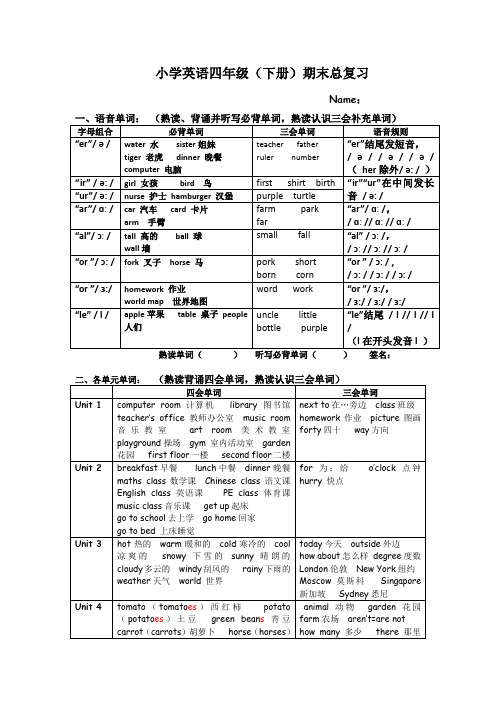
“or ”/ ɜ:/
homework作业
world map世界地图
wordwork
“or ”/ ɜ:/,
/ ɜ:/ / ɜ:/ / ɜ:/
“le” / l /
apple苹果table桌子people人们
uncle little
bottle purple
“le”结尾/ l // l // l /
熟读认识单词()听写四会单词()签名:
三、短语句子:(熟读背诵chant歌谣,解释中文并牢记)
Unit 1
Go to the library. Read a book.
Go to the teachers’office. Say Hello.
Go to the playground. Play football.
Put on a hat. Cold, byebye!
Mmm! It’s warm. It’s warm inside.
Take off your shoes. It feels so nice.
Unit 4
I like tomatoes. I like potatoes.
Carrots I will try. I love to eat green beans.
how about怎么样degree度数London伦敦New York纽约
Moscow莫斯科Singapore新加坡Sydney悉尼
Unit 4
tomato(tomatoes)西红柿potato(potatoes)土豆green beans青豆carrot(carrots)胡萝卜horse(horses)马cow(cows)奶牛sheep(sheep)绵羊goat(goats)山羊lamb(lambs)羊羔hen(hens)母鸡these这些those那些
广州小学英语四年级下册知识总结归纳
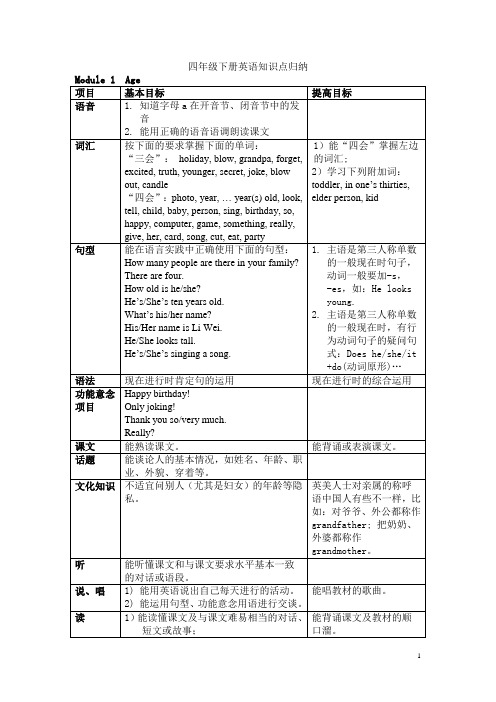
1.Which/What is his/her favourite sport?
2.Which/ What sport(s) is(are) he/she(they) good at?
语法
能正确理解和运用现在进行时态
功能意念
项目
Well done!
That’s great!
Go! Go! Go for it!
4.The boy is jumping low/high.
5.What’s your favourite sport?
The long jump./ The high jump./…
6.Which/ What sport are you good at?
I’m good at weight-lifting.
“四会”: sure, parent, will, play, wrong, part, important, interesting, uniform, does, doesn’t=does not, need, lady, enjoy, film, news, turn on, show, CD
2.能把下面的句子改成否定句和一般疑问句,如:
He/ She is skipping.
He/She isn’t skipping.
Is he/she skipping?
语法
现在进行时的否定句和疑问式及其综合运用
功能意念
项目
That’s good!
课文
能熟读课文。
能背诵或表演课文。
话题
能谈论人的基本情况和正在进行的活动
1)能“四会”掌握左边的词汇;
2)懂得主语为第三人称单数时动词的一般现在时形式
英语四年级下册必考点
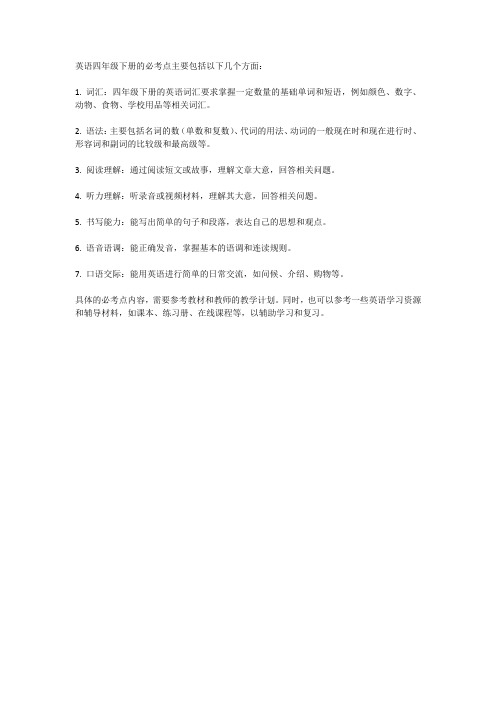
英语四年级下册的必考点主要包括以下几个方面:
1. 词汇:四年级下册的英语词汇要求掌握一定数量的基础单词和短语,例如颜色、数字、动物、食物、学校用品等相关词汇。
2. 语法:主要包括名词的数(单数和复数)、代词的用法、动词的一般现在时和现在进行时、形容词和副词的比较级和最高级等。
3. 阅读理解:通过阅读短文或故事,理解文章大意,回答相关问题。
4. 听力理解:听录音或视频材料,理解其大意,回答相关问题。
5. 书写能力:能写出简单的句子和段落,表达自己的思想和观点。
6. 语音语调:能正确发音,掌握基本的语调和连读规则。
7. 口语交际:能用英语进行简单的日常交流,如问候、介绍、购物等。
具体的必考点内容,需要参考教材和教师的教学计划。
同时,也可以参考一些英语学习资源和辅导材料,如课本、练习册、在线课程等,以辅助学习和复习。
四年级英语下册 第一、二单元重点知识科教版(广州)
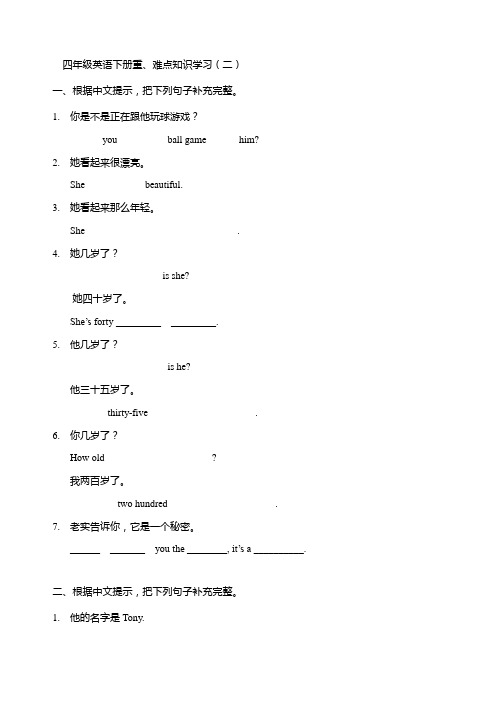
四年级英语下册重、难点知识学习(二)一、根据中文提示,把下列句子补充完整。
1.你是不是正在跟他玩球游戏?______ you _________ ball game______ him?2.她看起来很漂亮。
She ___________ beautiful.3.她看起来那么年轻。
She _______ _______ ____________.4.她几岁了?________ ________ is she?她四十岁了。
She’s forty _________ _________.5.他几岁了?________ _________ is he?他三十五岁了。
_______ thirty-five _________ __________.6.你几岁了?How old ________ ___________?我两百岁了。
_________ two hundred __________ _________.7.老实告诉你,它是一个秘密。
______ _______ you the ________, it’s a __________.二、根据中文提示,把下列句子补充完整。
1.他的名字是Tony._______ ________ is Tony.2.她的名字是。
Nancy_______ _________ is Nancy.3.她是一个婴儿,他是一个小孩,他是一个老人。
She’s a ______, he’s a ________, he’s ____ old ________.4.她看起来老,他看起来很英俊。
She ______ very _________, he ______ very __________.5.他大概五十岁。
He’s _________ fifty ________ _______.6.她正在做家务。
She _______ _________ housework.7.她正在跳绳。
广州版小学英语四年级下册单词及音标学习
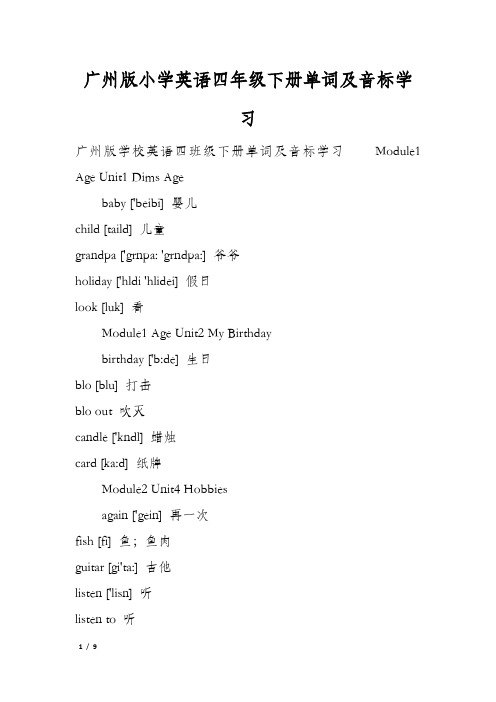
广州版小学英语四年级下册单词及音标学习广州版学校英语四班级下册单词及音标学习Module1 Age Unit1 Dims Agebaby ['beibi] 婴儿child [taild] 儿童grandpa ['grnpa: 'grndpa:] 爷爷holiday ['hldi 'hlidei] 假日look [luk] 看Module1 Age Unit2 My Birthdaybirthday ['b:de] 生日blo [blu] 打击blo out 吹灭candle ['kndl] 蜡烛card [ka:d] 纸牌Module2 Unit4 Hobbiesagain ['gein] 再一次fish [fi] 鱼;鱼肉guitar [gi'ta:] 吉他listen ['lisn] 听listen to 听paint [peint] 绘画radio ['reidiu] 收音机read [ri:d] 读ready ['redi] 预备好still [stil] 仍旧story-book 故事书ork [:k] 工作yet [jet] 仍旧Module2 Unit5 What the Aliens Enjoy Doingdance ['da:ns] 跳舞fun [fn] 乐趣;消遣have fun 玩得快乐instrument ['instrumnt] 乐器kid [kid] 小孩;开玩笑lake [leik] ['leik] 湖model ['mdl] 模型musical ['mju:zikl] 音乐的musical instrument 乐器out there 外面的那个地方sea [si:] 海洋Module3 Unit7 School Sports Dayacross ['krs] 穿过baton ['btn] 接力棒catch [kt] 接住;捉住catch up 赶上fall [f:l] 降落;倒下fall over 跌倒fast [fa:st] 快的field [fi:ld] 田地;牧场get [get] 成为;得到go for it 快点;努力high [hai] 高的high jump 跳高long jump 跳远sloly ['slul] 慢地team [ti:m] 队ave [eiv] 波动inner ['in] 获胜者Module3 Unit8 Sports Starsalso [':lsu] 也badly ['bdli] 坏be good at 擅长championship ['tmpjnip] 锦标赛favourite ['feivrit] 宠爱的gold [guld] 黄金good [gud] 好Here e come 我们来啦lo [lu] 低;矮medal ['medl] 奖牌record ['rek:d] 记录reporter [ri'p:t] 记者setter ['set] 缔造者eight-lifting 举重Well done 干(做)得好Module4 Unit10 A School Playboring ['b:ri] 无聊的;令人厌烦的concert ['knst] 音乐会does [dz; dz] 做doesn't 不做enjoy [in'di] 观赏fairy ['fri] 仙女film [film] 电影gentleman ['dentlmn] 绅士gentlemen ['dentlmn] 男士important [im'p:tnt] 重要的interesting ['intristi] 好玩的lady ['leidi] 女士need [ni:d] 需要parent ['prnt] 双亲part [pa:t] 部分;成分play [plei] 玩programme ['prugrm] 节目;项目sure [u] 确信uniform ['ju:nif:m] 制服What's rong 怎么了ill [il l l l] 情愿;要rong [r] 错误的广州版学校英语四班级下册单词及音标学习Module4 Unit11 Radio and Televisioncartoon [ka:'tu:n] 动画片CD 光盘Donald Duck 唐老鸭Micky Mouse 米老鼠nes [nju:z] 新闻sho [u] 展现;演出turn on 打开Module5 Unit13 The Food and Drink We Likebest [best] 最好的bottle ['btl] 瓶子bol [bul] 碗bun [bn] 馒头chips [tips] 炸土豆条coffee ['kfi] 咖啡coke [kuk] [kuk kuk] 可乐cup [kp] 杯子delicious [di'lis] 美味的dim-sum 点心dumpling ['dmpli] 饺子fried [fraid] [fri:d] 油煎的horrible ['hrbl] 恐怖的juice [du:s] 汁;液noodles 面条piece [pi:s] 一块plate [pleit] 盘子porridge ['prid] 粥rice noodles 米粉sandich ['snid -t] ['snit -d] 三明治tea [ti:] 茶toast [tust] 吐司ater [':t] 水Would you like... 你情愿吗Module5 Unit14 School Lunchbeef [bi:f] 牛肉beefsteak ['bi:fstek] 牛扒cabbage ['kbid] 洋白菜chicken ['tikin] 鸡;鸡肉chocolate ['tklit] 巧克力dessert [di'z:t] 甜点either ['a(r)] 二者之一;要么hamburger ['hmb:g] 汉堡包ice cream 冰淇淋kno [nu] 知道main course 主食nothing ['ni] 没有什么pasta ['pa:st] 意大利粉problem ['prblm] 问题roast [rust] 烤(肉)salad ['sld] 色拉soup [su:p] 汤tomato [t'ma:tu t'meitu] 西红柿Module6 Unit16 In the Marketanything ['enii] 任何事(物)broccoli ['brkli] 花椰菜carrot ['krt] 胡萝卜cent [sent] 美分change [teind] 零钱cost [kst] 花费dollar ['dl] 美元else [els] 别的fresh [fre] 新奇的half [ha:f] 半;一半kilo ['ki:lu'k-] 千克;千米Let's see 让我们想想mushroom ['mrum] 蘑菇onion ['njn] 洋葱pepper ['pep] 辣椒粉potato [p'teitu] 土豆That's it 就这些vendor ['vend:] 卖主Module6 Unit17 The Vegetables and Fruits We Need banana [b'na:n] 香蕉cheap [ti:p] 廉价的cheaper 更廉价的fruit [fru:t] 水果grape [greip] 葡萄next [nekst] 紧挨着的pizza ['pi:ts] 比萨饼vegetable ['veditbl] 蔬菜。
四年级下册英语知识点归纳总结

四年级下册英语知识点归纳总结
词汇:四年级下册的英语词汇量较大,主要包括动物、食物、学习用品、家庭成员、职业、数字、颜色、形状等方面的词汇。
学生需要掌握这些词汇的拼写、发音和含义,并能够在实际语境中运用。
语法:四年级下册的英语语法主要涉及一般现在时、现在进行时、一般过去时等时态,以及名词的复数形式、动词的第三人称单数形式等。
学生需要了解这些语法规则,并能够在实际句子中正确运用。
日常用语:四年级下册的英语日常用语主要涉及问候、介绍、表达感谢和道歉等方面。
学生需要掌握这些日常用语的表达方式,并能够在实际生活中运用。
除了以上三个方面的知识点,四年级下册的英语还包括一些阅读、写作和听力方面的技能培养。
学生需要通过大量的练习和实践,不断提高自己的英语综合能力。
总之,四年级下册英语的知识点归纳涉及多个方面,学生需要全面掌握这些知识点,并能够在实际生活中运用。
同时,教师也需要根据学生的实际情况,采用多种教学方法和手段,帮助学生更好地掌握英语知识和技能。
广州四年级英语下册总复习
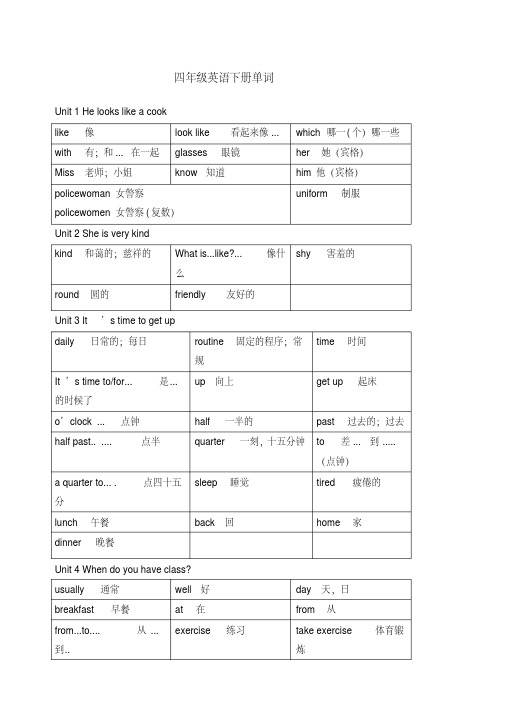
(点钟)
a quarter to... .
点四十五 sleep 睡觉
tired 疲倦的
分
lunch 午餐
back 回
home 家
dinner 晚餐
Unit 4 When do you have class?
usually 通常
well 好
breakfast 早餐
at 在
from...to....
从 ... exer from 从 take exercise 炼
体育锻
run 跑步
go running 去跑步
Unit 5 What day is it today?
week 周末
today 今天
Thursday 星期四
why 为什么
Monday 星期一
Tuesday 星期二
Saturday 星期六
① The new English teacher is in the teachers
’ room.
② Really? What is she like?
③ She has green eyes and a small mouth.
④ And she is very young and shy.
⑤ She is very kind.
basketball 篮球 think 想 table tennis 兵乓球 hight 高的;高地 chess (国际)象棋
football 足球 skate 溜冰 jump 跳 the high jump 跳高
Unit 10 I am very fast
arm 手臂 water 水 clever 聪明的
volleyball 排球 bath 洗澡 badminton 羽毛球
- 1、下载文档前请自行甄别文档内容的完整性,平台不提供额外的编辑、内容补充、找答案等附加服务。
- 2、"仅部分预览"的文档,不可在线预览部分如存在完整性等问题,可反馈申请退款(可完整预览的文档不适用该条件!)。
- 3、如文档侵犯您的权益,请联系客服反馈,我们会尽快为您处理(人工客服工作时间:9:00-18:30)。
广州版英语四年级下册复习要点Module 1 Age1、调查、了解别人情况的有关用语What’s your name?What’s…’s name?How old are you?—I am …years old.How old is he/she is(about)…years old2、现在进行时的使用。
表示现在正在发生事情或动作,时态结构是:人称+am/are/is+动词ing形式eg:I am fishing.He/She the cat is fishing.3、描写一个人的外貌特征He/She looks+young/beautiful/strong/tall4、祝贺生日的用语:Happy birthday! 回答:Thank you!5、动词ing的基本变化规则(1)直接加ing,如do—doing, paint—painting(2)去e再加ing,如have—having, come—cominggive—giving, drive—driving, make—makingclose—closing, use—using(3)双写最后一个辅音字母,再加ing,如:shop—shopping, skip—skipping, sit—sittingrun—running, put—putting, get—gettingswim—swimming, forget—forgettingModule 2 Activities思考问题1、复习现在进行时的时态,结构:am/are/is+动词ing。
表示形式一般有。
I’m listening to the music.He is cooking in the kitchen.She is skipping.You are playing.We are dancing.口诀:三个朋友不分离,缺了一个出问题,I与am,you与are,is搭配他,她,它,(he,she,it)2、注意询问数量的时候,无论回答的数量有多少,都要用复数提问:How many apples are there? —There is one.How many cats are there? —There are three.3、留意动词play后紧接的名词:(1) play+名词,如:play chess/music/ basketball/football……(2)play+the+乐器的名词如:play the guitar/play the piano4、询问别人在干什么What are you doing?What is he/she doing?What are they doing?5、告诉别人你热衷的活动,用like/enjoy+动词ing ,如: I like swimming, I enjoy reading.Module 3 Sports思考问题1、注意本模块中出现的短语和句子的中文意思。
学习后能否做到实际中运用它们?fall over跌倒了across the field穿过场地/田野go for it为….努力catch up赶上来了a setter of a world record 世界记录创造者2、请注意“某人擅长于什么”的句型结构:somebody (某人)be good at (doing)something(做某事)例子:I’m good at playing table tennis.You’re good a t swimming.She/He/Tom is good is running.They/The athletes are good at swimming.3、动词ing的使用要点:(1)进行事的使用要点,人称+am/are/is+动词ing形(doing),如I am watching TV./The children are play games./Janet is reading. (2)句子中有enjoy或like,紧跟后面的动词要用ing形式,如:I like swimming,They enjoy playing football。
(3)be good at 短语后面的动词,要用ing形式,如:I am good at singing.We are good running.The cat is good at catch mice(老鼠)4、你有注意本块模式一些有关激励、赞扬的句子吗?That’s great!Our Chinese team is great!Well done!Our team is the winner!Go!Go!Go for it.Module 4 Entertainment思考问题1、你是否留意把一些娱乐场所和一些娱乐项目进行分类记忆呢?娱乐场一般可以欣赏的项目cinema 电影院film 电影theater 剧院play 戏剧show 展览entertainment 娱乐2、你是否注意表达“某人喜欢什么……的句子结构呢?I/you/we like sth./doing sth.He/She likes sth/doing sth.(1)like后跟动词ing形式.I like playing chess。
You like eating ice-cream。
We like listening to the radio every morning.They like watch the news on TV.(2)like 后跟名词I/You/We/They like English。
She/He/Tom likes toys。
但要和“look、like”分清3、请留意有关电视节目TV programme有不少的内容:TV plays/music programme/news/sports programme/cartoon4、你是如何评价这些娱乐节目的?你在平时交流中用下列的用语吗?(1)本单元出现的:What do you think(of…)?It’s boring. /It’s great. /It’s interesting./ It’s funny.1、请注意,当你要表达自己的想法时,会使用这样的引导语吗?I’m sure……I think……当要询问别人也有这样的想法时,就会用:What’s your idea? What about you?What’s wrong? Do you……6、“打开”电器要用“turn on”,不能用“open”,如:turn on the TV turn on the radio turn on computer7、一般现在时的使用:1、定义:一般现在时表示已形成习惯、规律的动作或状态。
2、特征:通常句子中有often、usually、或sometimes、on Monday等等。
3、肯定句的结构:人称+动词:①其他人称(I、you、we、they、the boys……)+动词原形②第三人称单数(he、she、it、many……)+动词“s”形式例句:The boys like TV plays.Sally likes TV plays.4、一般疑问句:助动词(Do/Does)+人称+动词原形Do the boys like TV plays?Does the boy like TV plays?5、否定句:人称+助动词否定形词(don’t/does n’t)+动词原形The boys don’t like TV plays.The boy doesn’t like TV plays.6、记住:助动词一出,后面动词用原形。
Module 5 Food and Drink思考问题1、注意英文中名词的表达方法和形式。
名词:可数名词(可以直接在前面用a、an来修饰)不可数名词(不可以直接在前面用a、an来修饰)2、不可数名词结构:数量+量词+of+不可数名词,如:a piece of toast、a cup of tea、a bottle of orange juice、a bowl of rice、a plate of noodles、a cup of coffee、a bottle of milk、a glass of water△如果要变成复数,就在量词末尾加“s”,如:two pieces of bread、five glasses of milk△不可数名词除了上面的表达外,还可以:some tea/juice/coffee/rice /milk/toast/water△记住不可以在不可数名词面前直接用a、an来修饰。
3、你有否注意梳理下列询问和回答的形式?1)询问别人是否喜欢吃某些食物:Do you like/have some……?2)更婉转的询问方式:Would you like/have some……?3)回答方式:应允:Yes, please. /OK. /Yes, I do. /Thank you. /Thanks.……拒绝:No, thanks. /Sorry, I don’t like/have……4)询问别人想吃/喝什么:What do you like to eat/drink?What do you want for starters?应允:I like拒绝:No, thank you. / Thanks. No thing for me, thanks.4、有否观察到课文中来自不同国家的人所选择的食物,如:Sally/Mike likes pasta、hamburger、chips、saladJiamin/Xiaoling likes rice、Chinese cabbage、soup、porridge、noodles、dumplings 5、“也”的不同表达方法:1)too/also 用于肯定句2)either 用于否定句肯定句:I like salad, I like soup too.I like salad, I like soup also.I like salad, I also like soup. (also可放句中或句尾)否定句:I don’t like salad, my mother doesn’t like salad either.Module 6 Shopping思考问题1、温故知新,询问价钱表示方式:How much is the……? It’s……How much does the……cost? It’s cost’s……How much are the……? They are……How much do the……cost? They cost……2、请注意一些价钱,斤两的短语:One dollar a kilo 2 dollars 60 cents a kilo half a kiloa kilo of apples two kilos of potatoes3、请注意顾客表示满意的表达方式:They look good/It looks goodThey’re really fresh/It’s really fresh4、表示不满意的表达方式:They’re/It’s too small/bigThey look/It looks not so good5、付款和找回零钱的表示方法:A:Here’s the money. (付款)B:Here’s the change. (找会零钱)6、有否注意以“o”结尾后的一些单词的复数形式?一个有趣的现象可助你记忆:它们加了复数后的字母是偶然数分类:(1) potato-potatoes tomato-tomatoes(2) photo-photo radio-radios注意:kilo-kilos7.人民币的“元”和英镑的说法¥1---one yuan \ ¥20---twenty yuan(没有复数形式)&1---one pound \ &20---twenty pounds(有复数形式)$1---- one dollar $20----twenty dollars (有复数形式)。
